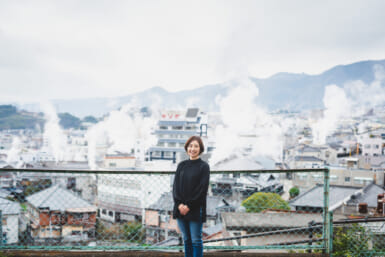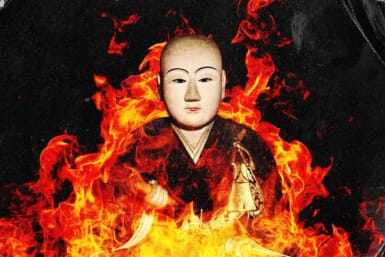by James Bailey
The first one sold cigarettes. The oldest one extant sold stamps. And one of the newest models sells, well, love.
Vending machines arc almost as ubiquitous in Japan as the Japanese. Indeed, there is now about one of the former for every 23 of the latter. Or, to put it another way, about 5.35 million machines for a little more than 125 million Japanese.
Located in the Motomachi section of Kobe, there is a vending machine which dispenses—for ¥1,000—a piece of paper on which is printed the name of an unmarried male, his address, date of birth, height, weight, university (or company), blood type, automobile (if any) and telephone number. If a buyer doesn’t like the description, she can keep feeding money into the machine until she locates that special guy.
For the first couple of months after the machine was installed in June of 1991, 500 of those ‘lucky fortunes” were sold daily. The current rate is about 200 a day, says the machine’s owner and creator, a Mr. Yamashita, who is certain that many marriages will result from his brainstorm. He is equally certain the exact number will be difficult to ascertain, given the reluctance of couples truthfully to tell how they came to set eyes on each other for the first time. Admitting that you found your intended through a personals ad is embarrassing enough; think how you’d feel if you found Mr. Right through a vending machine.
Yamashita, who charges men ¥3,000 to advertise their availability, says he hopes to expand his business by installing specialized machines for women looking for, say, future dentists or undergraduates at universities in the Tokyo area. Among his most frequent customers now are older women who buy dozens of fortunes in the hope of finding suitable mates for their daughters. And if the mate proves unsuitable, Yamashita will cheerfully refund ¥1,000 to the dissatisfied, no questions asked. What a deal!
Japan’s first vending machine, introduced in 1887, sold cigarettes. Today, vending machines account for 45 percent of all cigarettes sold, not to mention 80 percent of all canned drinks and 13,800 tons of regular coffee (as well as 4,150 tons of instant). Indeed, the rate at which machines are appearing outstrips at the rate at which potential customers are being brought into the world. Since 1964, the number of machines in the country has expanded 22-fold and they’re popping up at a brisk annual rate of three percent.
It is reasonable to speculate that Koshichi Tawaraya, the man responsible for the long-vanished cigarette machine that qualifies as the country’s oldest surviving automatic vendor, might be nonplussed by the items available in currently operating units.
Among them: tofu, pearls, popcorn, fish bait, umbrellas, hot-spring water, gold bars, video cassettes, records, CDs, underwear, Bibles, part-time job information, comic books, government revenue stamps, instant noodles, razors, socks, pinballs, toys, batteries, golf balls, pastries, hors d’oeuvres, meal tickets, movie theater admission tickets and “sacred objects.”
There are now even upscale versions of this coin-and bill-operated retail outlet so beloved by underage scofflaws in search of booze and cigarettes. Designed for use in the best of companies, the new machines come complete with monitors for the playing of appropriately sedate background music. They can even be ordered in colors guaranteed to blend in with the decor of the office—various blues, reds, greens and especially suitable for commodity traders, pork belly fuchsias.







